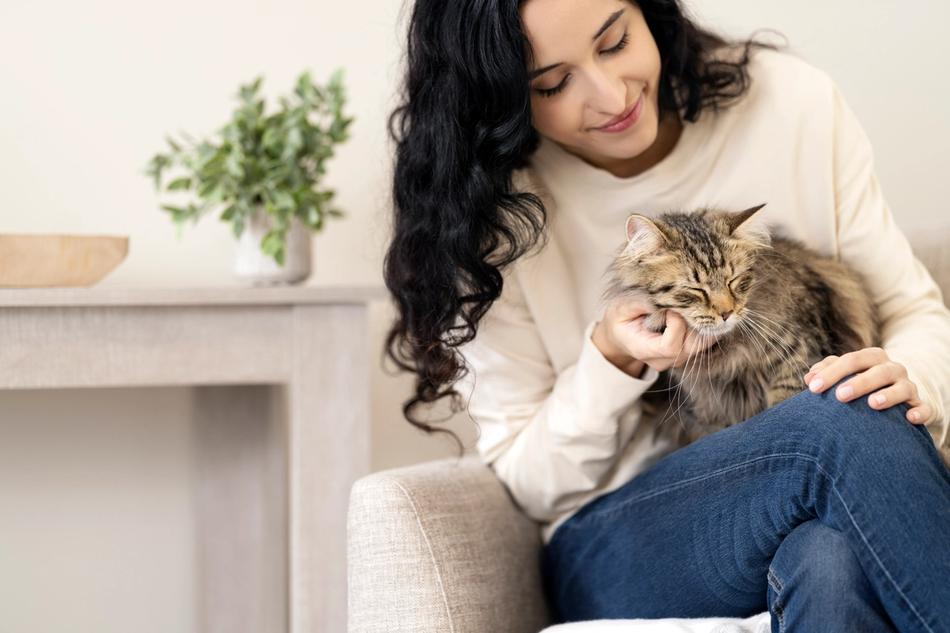
June 7, 2024
PetSafe® Expert
PetSafe® Guest
Why Is My Cat Pooping on My Bed?
There’s nothing quite like the cozy comfort of curling up in bed with your purring feline friend after a long day. However, if you're greeted by an unwelcome discovery on your sheets—your cat’s unexpected ‘gift’—it can leave you bewildered and searching for answers. Why would a cat, usually so meticulous about its litter habits, choose your bed as a bathroom? Before you worry that your beloved pet is out to spite you, let’s explore some of the common and solvable reasons behind this distressing behavior. This guide will provide you with the understanding and tools you need to help keep your bed clean and your cat happy.

Possible Health Reasons
When your cat chooses your bed over their litter box, it’s crucial to start with a visit to the vet. Cats are adept at hiding their discomfort, and a medical issue could be the underlying cause of their unusual choice. Several health conditions might prompt your cat to avoid the litter box, leading them instead to seek out a place where they feel safe and comfortable—like your bed.
- Digestive Disturbances: Conditions like inflammatory bowel disease (IBD) or intestinal parasites can disrupt your cat's normal bowel habits. Pain or discomfort during elimination may lead your cat to associate the litter box with these negative feelings.
- Mobility Issues: As cats age, they may develop arthritis or other joint problems that make it painful to climb into or squat within their litter box. If the litter box is too high or too cramped, your bed might seem like a more accessible option.
- Urinary Tract Infections or Blockages: These can cause urgent needs to eliminate, which might lead your cat to choose the closest available option. If your bed is the most accessible spot during a moment of distress, it might become an unintended target.
A thorough examination by your veterinarian can help rule out these and other health issues. Ensuring your cat is healthy not only gives you peace of mind but also eliminates one of the more distressing reasons for this behavior. If health issues are discovered, addressing them might quickly resolve the litter box avoidance.
By understanding the medical factors that could influence your cat's behavior, you can better tailor your approach to meet their needs, ensuring they feel comfortable and cared for in your home. If your cat's vet visit confirms that health isn't the factor, it’s time to consider environmental and emotional triggers that might be impacting their behavior.

Environmental and Emotional Triggers
Cats are sensitive creatures, and their environment heavily influences their behavior. A change in your home’s dynamics or in your daily routine can significantly impact your cat's emotional well-being, potentially leading to unwanted behaviors like pooping on your bed. Understanding and addressing these triggers can help prevent future incidents and ensure your cat feels secure and happy in their environment.
- Changes in the Household: Moving to a new house, adding new family members (including pets), or even rearranging furniture can unsettle your cat. Cats thrive on routine and familiarity, so any significant change can cause stress, leading them to seek comfort in your scent-laden bed.
- Owner Absence and Changes in Attention: Changes in your schedule, such as returning to the office after working from home or going on a trip, can distress your cat. If they feel neglected or anxious due to your absence, they may poop on your bed as a way of coping with their anxiety or to make a statement about their displeasure.
- Conflict with Other Pets: If there are other pets in the home, your cat might feel threatened or bullied, particularly around shared resources like litter boxes. This can drive them to find a safer place to relieve themselves, such as your bed, which smells strongly of you and feels like a secure environment.
To mitigate these issues, try to maintain a stable routine and give your cat plenty of attention and reassurance during times of change. Provide safe, quiet spaces where your cat can retreat when they feel overwhelmed. Additionally, consider the use of calming products like pheromone diffusers, which can help soothe stressed pets.
Addressing these environmental and emotional factors is a key step in creating a stable and reassuring home environment that discourages your cat from inappropriate elimination. Next, we will explore litter box issues that might be encouraging this problematic behavior.

Litter Box Issues
Litter box problems are one of the most common reasons cats may start avoiding their designated areas and choose places like your bed instead. Addressing these issues requires understanding your cat’s preferences and the potential pitfalls that could make their litter box less appealing.
- Litter Box Cleanliness: Cats are extremely clean animals, and a dirty litter box can be very off-putting. Ensure you scoop the litter box daily and change the litter regularly. If a litter box isn't maintained to their standards, cats may choose a cleaner, more appealing spot—like a seldom-used guest bed.
- Type and Placement of Litter Box: The type of litter box can also play a significant role. Some cats prefer open boxes, while others may feel more secure in covered ones. The box should be large enough for your cat to turn around comfortably. Placement is equally important; the litter box should be in a quiet, low-traffic area yet easily accessible. Avoid placing it near noisy appliances like washers or in areas that are difficult to reach.
- Litter Type: The texture and smell of the litter are also crucial. Some cats may avoid strongly scented litters or litters that are uncomfortable on their paws. Experimenting with different types of litter, such as those available on our Cat Litter page, can help you find one that your cat prefers.
- Number of Litter Boxes: In multi-cat households, the general rule is one litter box per cat, plus one extra. Competition or intimidation between cats can lead to one avoiding the litter box if they feel it's too risky or if it's often occupied.
Making thoughtful adjustments to the litter boxes in your home can significantly impact your cat’s litter habits. Consider trying a solution like the ScoopFree® Crystal Classic Self-Cleaning Litter Box, which can help maintain cleanliness without the constant need for manual scooping.
Addressing litter box issues not only helps eliminate your cat's bed-pooping behavior but also enhances their overall comfort and happiness at home. Next, we'll provide some actionable solutions and preventive measures to help keep your bed free of unwanted surprises and ensure your cat uses their litter box properly.

Solutions and Prevention
Once you've addressed potential health concerns, environmental stressors, and litter box issues, it's important to implement practical solutions and preventive measures to encourage proper litter box use and keep your bed clean. Here are some effective strategies to help your cat adjust their habits:
- Make the Bed Unappealing: Temporarily make your bed less inviting for your cat when you're not around. You can use cat deterrent sprays or natural deterrents like citrus peels or a plastic cover to discourage them from jumping on it. Ensuring your bedroom door is closed when you are not home can also prevent access.
- Reinforce Positive Litter Box Habits: Whenever your cat uses the litter box correctly, offer immediate praise and treats. This positive reinforcement helps them associate the litter box with good experiences.
- Provide Multiple Escape Routes: Especially in multi-cat households, ensure that each litter box is positioned so that no cat feels trapped. Having multiple exit strategies can prevent ambushes by other pets and reduce stress for more anxious cats.
- Increase Environmental Enrichment: Keep your cat stimulated and entertained to reduce stress and anxiety. Use cat trees, interactive toys, and regular playtime to engage their minds and bodies. This can divert their attention away from negative behaviors like inappropriate elimination.
- Routine Health Checks: Regular veterinary check-ups can help catch and address any new or recurring health issues before they lead to litter box avoidance.
Implementing these solutions requires consistency and patience, but over time, they can significantly alter your cat’s behavior for the better. Not only will this make for a happier, healthier cat, but it will also restore your bedroom to the peaceful sanctuary it should be.
Get Email Updates
Subscribe to the latest news, promotions, & more from PetSafe® brand.
Sign up today for the latest news, promotions, and more from PetSafe® brand.







